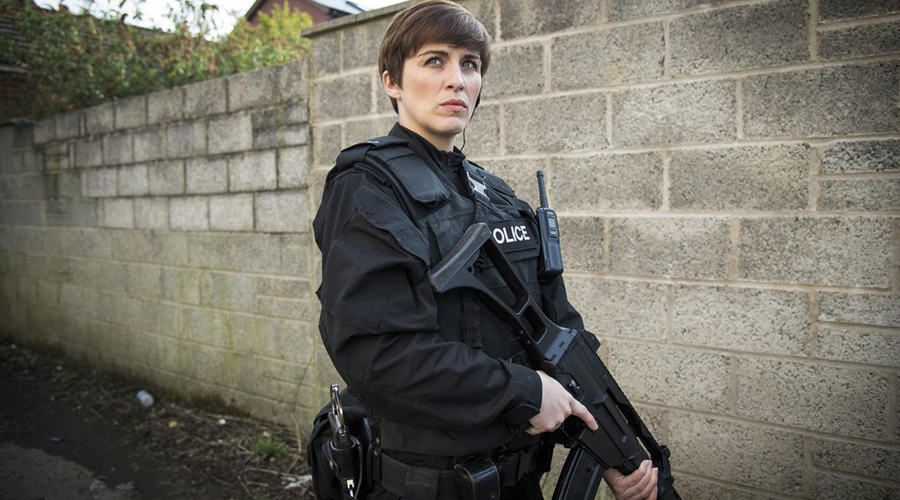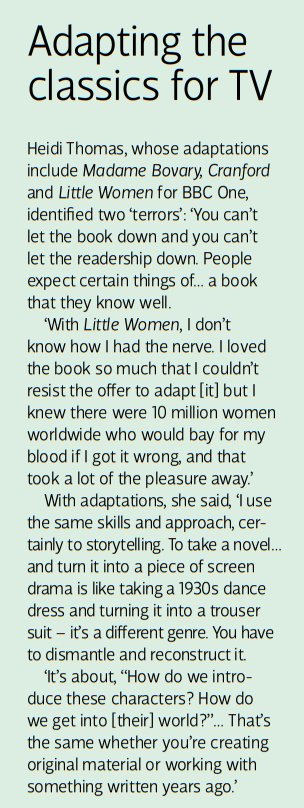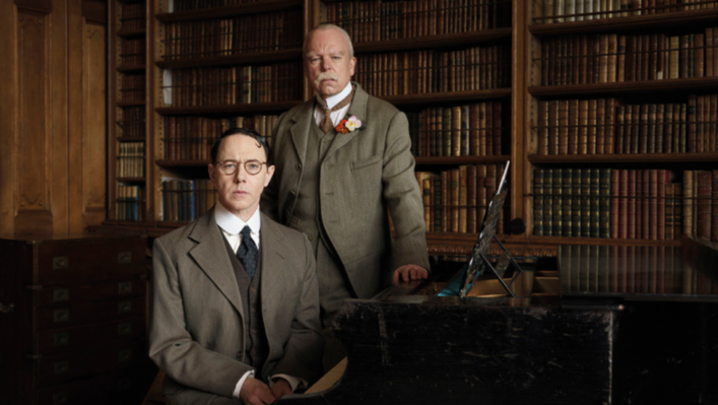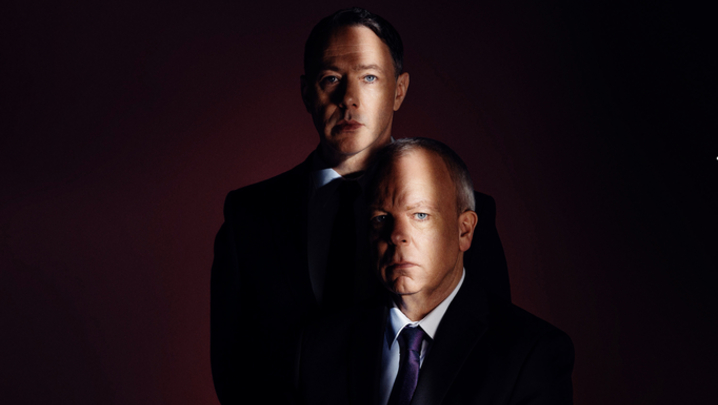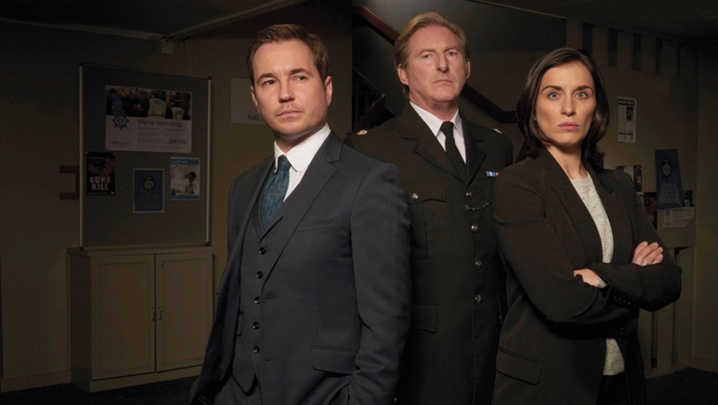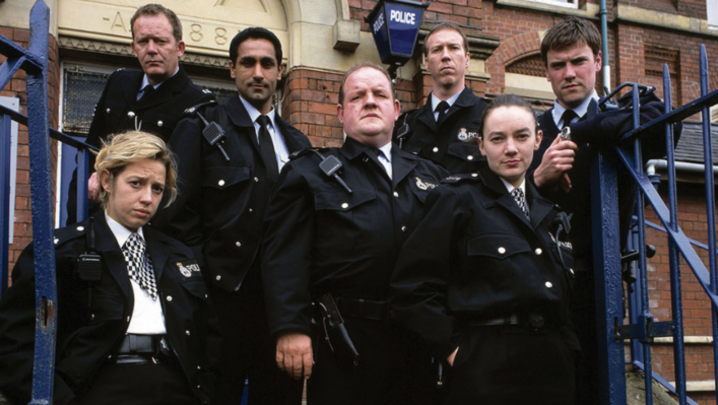Melvyn Bragg hosted a special event at which top writers revealed their modi operandi. Matthew Bell reports
Veteran arts programme The South Bank Show has celebrated the best of TV drama from its earliest days. In the very first series it aired a film on Dennis Potter. Since then, Andrew Davies, Paul Abbott, Jimmy McGovern and Sally Wainwright have all featured.
“There’s nothing patronising about why we started with television drama. I’d been going to the theatre quite a bit and I discovered again and again that it wasn’t as good as what I was seeing on television – it wasn’t as well written, directed or acted,” said the show’s editor and presenter, Melvyn Bragg, who famously conducted the last-ever TV interview with a terminally ill Potter.
“Television drama has been at the centre of this country’s cultural conversation for over half a century and rarely more so than now – and that’s to do with the quality of the writing.”
Bragg was speaking at a special live edition of The South Bank Show, featuring four of the UK’s leading TV writers – Jed Mercurio (writer and creator of hit police corruption thriller Line of Duty); Steve Pemberton and Reece Shearsmith (black comedy anthology Inside No 9); and Heidi Thomas (period drama Call the Midwife).
The RTS early-evening event was held at the end of June, a few weeks in advance of The South Bank Show’s new run on Sky Arts, and looked at the work of these four writers, plus Jack Thorne (National Treasure). He was unable to attend the RTS event as it clashed with the opening night of his new play, The End of History..., at the Royal Court.
The South Bank Show first aired on ITV in 1978, moving to Sky Arts in 2012. Bragg, who has been at the helm throughout, asked the panel about the importance of storytelling.
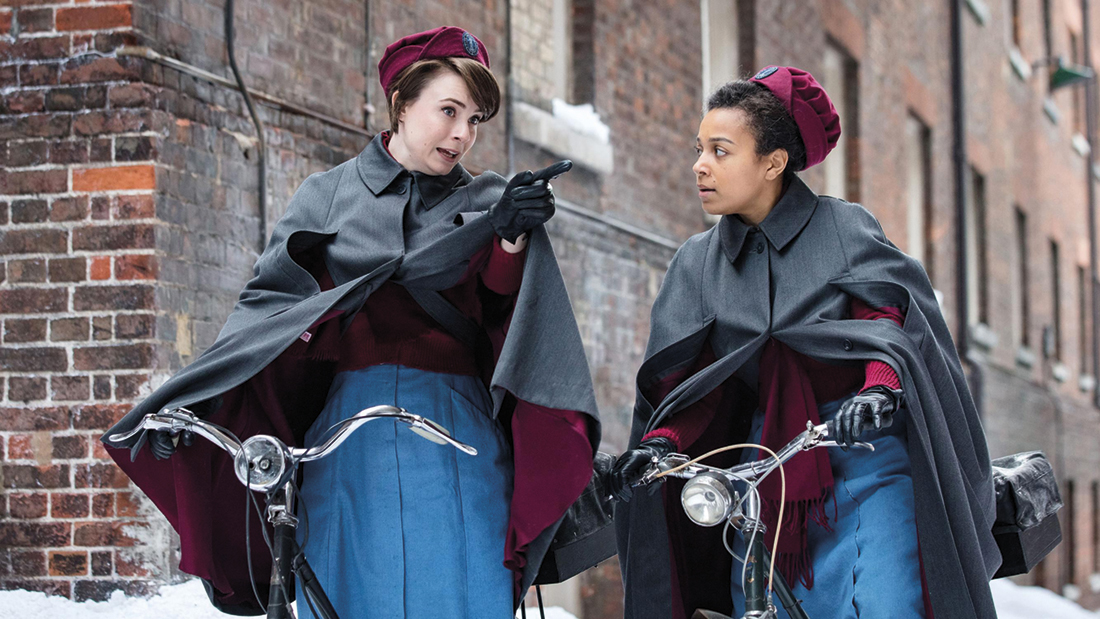
Thomas argued that “people need stories for distraction, inspiration and sometimes they just need them to pass an hour that would otherwise be painful for them”.
Pemberton said: “Narrative is everywhere – you watch a football match and that has an incredible narrative to it. [There’s the] Women’s World Cup at the moment or the Tory party leadership contest – you want to know what happens next.
“You will find narrative in everything and we try to serve that up to an audience that might be curious to see what happens next, and see if we can entertain them along the way.”
Telling stories, suggested his writing partner, Shearsmith, is getting harder “because everyone is so sophisticated”. He explained: “Attention spans are so short that you’ve got to be pithy in hooking people into your story.”
Thomas had no truck with “people who often charge a lot of money for teaching screenwriting but who’ve never written for the screen. They sell a prescription, essentially, and I’ve never found that to be of any assistance.
“For me, it’s not about structure: it’s about texture – you go by the feel of the thing. It’s like running a cloth through my hands, feeling my way [through the story].”
Thomas added that the best advice she’d come across was from Charlie Chaplin, who said: “I have never written down to my audience.”
There was agreement on the panel that, despite their trade, there’s more to good drama than the writing alone.
“It’s no accident that we have the same three leads [Line of Duty’s Adrian Dunbar, Vicky McClure and Martin Compston] – they’re really good actors, but also get on really well with each other,” said Mercurio. “If that hadn’t happened, one of them would have been killed off in a completely unexpected way to propel the story forward.”
He continued: “In Bodyguard, Richard Madden and Keeley Hawes were both actors I’d worked with before. It’s hard to film television drama – you need people who aren’t nuts or lazy.”
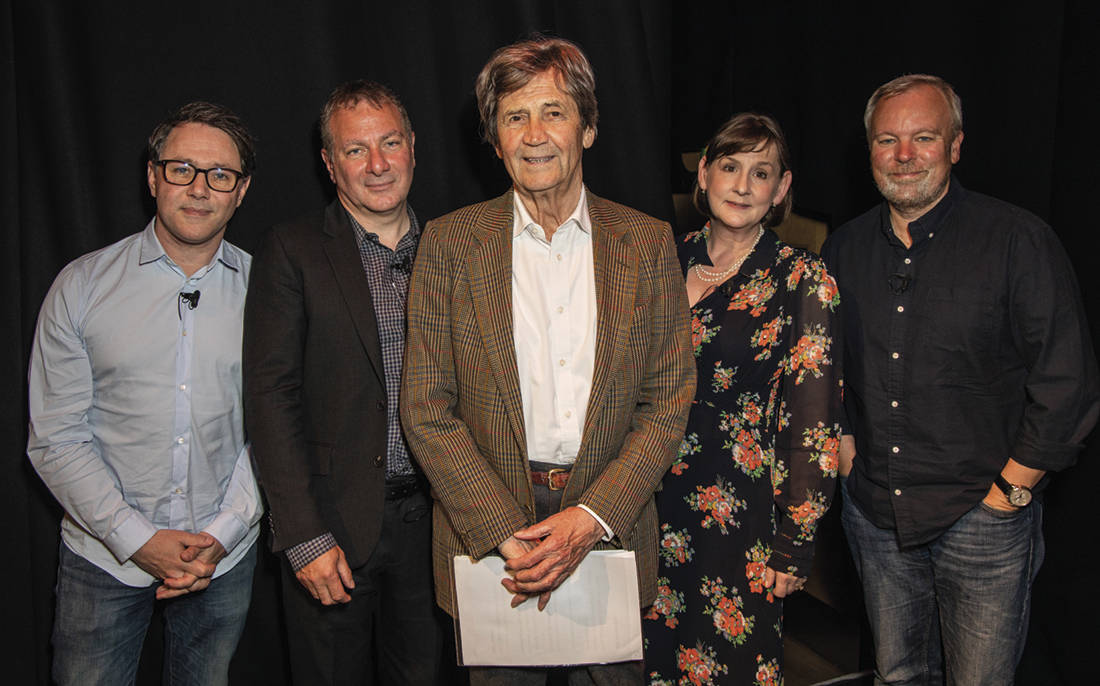
and Steve Pemberton (Credit: Paul Hampartsoumian)
Thomas said: “Writers don’t always have control over whether people stay or not. Writing Call the Midwife for nine years has been an exercise in forbearance – young ladies come on the show and, three years later, they decide it’s time to go to Hollywood.
“Every time it’s like a stab through the heart but I’ve now learned that this refreshes the brand and the company, bringing in new characters and stories.”
Bragg asked if dramatists should write about what they know. “I started writing very young and I didn’t know much, so I would have got to a dead end quite quickly if I’d only written about what I knew,” answered Thomas.
“I’ve led quite a tedious existence – if I wrote [only] about what I knew it would be really boring,” she joked.
Mercurio was a hospital doctor before turning to writing. His first drama, 1994’s BBC One series Cardiac Arrest, was firmly rooted in that experience. Cardiac Arrest, which ran for three series, was a darkly comic programme, unafraid to show the reality of working in an NHS hospital.
He said he was reacting against the “sanitised version of what was going on in hospitals” in shows such as Casualty – a “juggernaut [that will] be on long after the world is dust”.
Mercurio was keen to capture the “gallows humour” and challenge the “earnest way” in which people talked in medical dramas: “The way medical dramas tend to work is that someone comes into hospital with a medical problem and then, remarkably, they find someone who gives a shit about their personal problems and then gives them [advice]. In real life, that just does not happen – you go in with a personal problem and, ‘Who gives a toss?’
“The way to challenge that earnestness was through humour.”
Pemberton agreed: “Humour is something that any drama should have and drama is something that any comedy should have – you don’t separate them in your mind.”
He came to writing via acting. “For us, it was a question of how we give ourselves the roles that no one else is giving us,” he said. “Gradually, over time, I think the writer has stepped forth and improved.”
Pemberton and Shearsmith’s first TV writing credits (with Jeremy Dyson and Mark Gatiss) came on BBC Two comedy series The League of Gentlemen, in 1999. “The first things that we wrote were about [government job scheme] Restart rooms, really bad theatre companies and strange northern towns, where you couldn’t wait to get out but somehow you couldn’t escape.
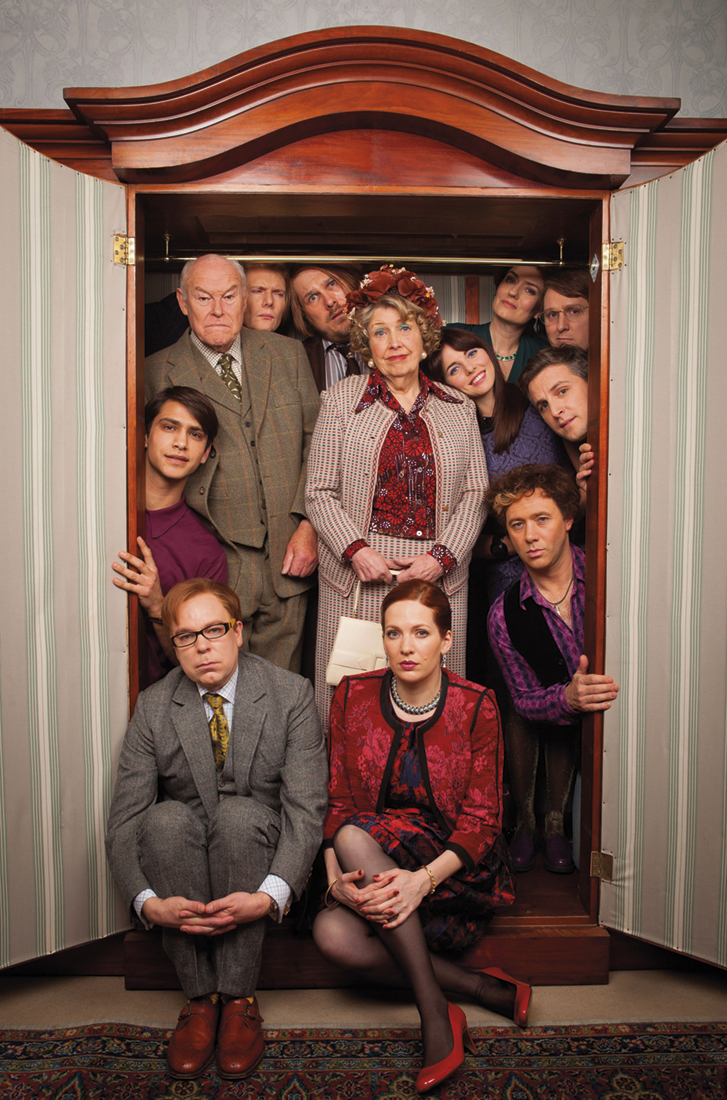
“Now, in Inside No 9, we write about anything. Something has to draw you to the subject in the first place.… There are your life experiences as a writer plus what you draw from other people’s as well.”
But even the most prolific dramatist experiences writer’s block from time to time. Pemberton argued that he was fortunate to be part of a writing partnership with Shearsmith: “We talk and talk and talk. If we don’t actually write anything, the day hasn’t been wasted. I have written things on my own and found it really hard to dig my way out of [a block].
“You just have to get something on the page… and I have to tell it to myself every single time I sit down to write.”
Thomas revealed that she suffers writer’s block daily. She advised: “First drafts don’t have to be perfect, they just have to be written. However ragged and full of holes it is, however much you’re embarrassed by it, you can then start to make it better.”
The RTS early-evening event ‘The South Bank Show Live’ was held at Kings Place in central London on 27 June. It was produced by the RTS, Directors Cut Productions, Sky Arts and Premier.
How to inspire a creative child
In his youth, Reece Shearsmith was struck by the BBC’s Play for Today, the dramas of Alan Bennett and Victoria Wood, ‘comedy that had a bite to it’.
‘There was something different about watching an Alan Bennett play on TV: the language felt richer somehow, and it appealed to me because it was a voice that was around me in the north – I am from Hull.
‘With Victoria’s stuff, it resonated [with me because] it was a northern voice. But there was also a savagery to it, hidden between the [lines].’
Heidi Thomas recalled that ‘there was a serendipity about television – suddenly, my mother would say, “There’s a film on this afternoon” and we’d drop everything and watch National Velvet or something.
‘I remember being fetched out of bed [to watch]… The Hunchback of Notre-Dame with Charles Laughton – I was only seven or eight – and my mother made me watch the whole film. I sobbed through everything… utterly harrowing, most unsuitable for a child, but I loved it.… It completely enervated me and I think it made me realise that stories do not always resolve in the way that you want.… That’s always stayed with me.’
‘I watched a lot of TV as a kid,’ said Jed Mercurio. I guess it was my only real access to the arts – I went to a very ordinary school, didn’t really do drama or have much access to creative things.… TV was my only exposure to storytelling, apart from occasionally going to the cinema.’
US shows figured more than the BBC’s, which ‘were all a bit middle-class. It was like watching a play, which is people talking about the past; it’s just dull – have a car chase instead. As a 12-year-old boy, I wanted the Americans giving us that.’
Steve Pemberton watched TV ‘avidly, especially in the summer holidays, when TV was yours as a kid. In the evening, there was the one remote control on the side of dad’s chair and you watched what the family watched.
‘But in the summer holidays, it was curtains closed and you had Laurel and Hardy on, The Banana Splits, The Flashing Blade.
‘And then there were late-night horror movies on BBC Two on a tiny TV when we shouldn’t have been allowed to see them.
‘Watching The Wicker Man and Don’t Look Now as probably a 12- or 13-year-old boy, both of which… have these horrific endings that you can’t process as you’re watching them, has stayed with me.… Something that ties a nice, neat bow at the end is too easily forgotten.’

